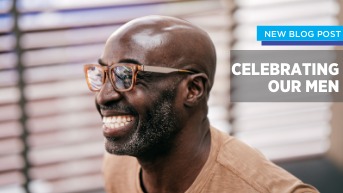Celebrating Our Men
On Thursday November 19, 2020, countries the world over will commemorate the annual International Men’s Day (IMD) which seeks to place squarely in the spotlight, the many myriad of issues affecting men globally. This year, Jamaica celebrates under the theme: ‘A Man’s Health is a Man’s Wealth’ which began with a church service featuring an address by Jamaica’s State Minister for Gender Affairs, Culture, Entertainment and Sport Hon. Alando Terrelonge, MP. In his remarks to the congregation, while noting that this year’s theme was increasingly important as the world battles the global pandemic, he emphasised the need for men to pay particular attention to their mental health. Noting that it was deteriorating in Jamaica, he had this to say, “When it comes on to men, depression, anxiety and an inability to cope day to day affect our men at an alarming rate in Jamaica so much so that some 89% of suicide victims are men. Statistics show that 9 out of every 10 suicides in Jamaica are men because our men can’t cope with their problems. In 2018, of the 61 suicides recorded, 56 were men and 5 were women and that is the extent of the psychological pressure men are burdened with daily so men need to unleash this burden.”
In highlighting the culture of silence amongst Jamaican men whilst offering encouragement, Terrelonge concluded by saying, “We live in a society that says it is not manly to speak about your problems or to show signs of crying or hurt but men need to find an outlet or an avenue or some kind of support system to speak about their problems. We need to lower that 89%, in fact, we want a Jamaica where we don't have suicides, so I want to encourage my brothers: less alcohol, less smoking and exercise is a good way to deal with anxiety, stress, depression and just to keep healthy generally. Protect yourselves by wearing a mask as we fight covid-19, find someone to speak to and just take the measures to ensure that your health remains the source of your wealth.” Other planned activities for this week include a church service, an observance and celebration forum, an awards ceremony honouring fathers and the implementation of the ‘Young Fathers of Jamaica’ initiative which is aimed at helping adolescent fathers to meet their parental responsibilities.
International Men’s Day was created to raise global awareness for issues affecting men and boys worldwide and is grounded in six (6) pillars:
• To promote positive male role models
• To celebrate men’s positive contributions
• To focus on men’s health and well-being
• To highlight discrimination against males
• To improve gender relations and equality
• To create a safer, better world
It’s genesis is traced back to 1968, when an American journalist named John P. Harris wrote an editorial in the Kansas-based Salina Journal highlighting a lack of balance in the Soviet system, which promoted an International Women’s Day in March for female workers but failed to deliver a male counterpart. Harris, while admitting he did not begrudge the Soviets for their ‘Womens’ Day’ celebrations, was of the belief that its resulting gender inequality clearly exhibited a serious flaw in the communist system, which, "makes much of the equal rights it has given the sexes, but as it turns out, the women are much more equal than the men." He went on to express that while the men went about their daily lives working and doing what their government and womenfolk tell them to do, there was no day when males were recognised for their service, leading Harris to conclude that "This strikes me as unwarranted discrimination and rank injustice." The following year on February 24, 1969, journalist Bernard Gwertzman writing for the New York times noted in his article, “Many men have been agitating privately to make February 23 International Men’s Day, the equivalent of March 8, which is International Women’s day since 1909.“ The publication of these articles would fuel persistent international calls for the creation of an IMD either by way of rhetorical questions about gender equality or in statements highlighting the contribution of men worldwide in their own right. Still, many decades would pass before the IMD gained serious global traction.
It was in 1992 that International Men's Day first took the form of a commemorative event when Professor Thomas Oaster, director of the Missouri Center for Men’s Studies at the University of Missouri in Kansas City, invited organizations in the United States, Australia, and Malta to hold small International Men’s Day events during the month of February. Oaster successfully hosted these events for two years, 1993 and 1994, but his 1995 attempt was so poorly attended, he became discouraged and ceased plans to continue the event in subsequent years. In these early years, IMD received overwhelming support in the Caribbean and due to the persistent networking and invitations sent to individuals in other nations, International Men’s Day regained firm footing on the international scene. The Caribbean initiative is now independently celebrated in over 80 countries as diverse as Singapore, Australia, India, United Kingdom, United States, South Africa, Haiti, Jamaica, Hungary, Malta, Ghana, Moldova, and Canada.
This revival was spearheaded by Dr. Jerome Teelucksingh from the University of the West Indies’ Trinidad and Tobago campus in 1999 who, upon realising that despite the existence of a Fathers’ Day, there was no day to celebrate young boy, teenagers or men who did not have children, understood the importance of reinforcing positive male role models. His own relationship with his father with whom he shared a close bond and saw as an excellent example for him, led him to coordinate activities that culminated in an International Men’s Day celebration on November 19 — the day of his father’s birthday as well as the day his country’s national soccer team had united the nation with their endeavors to qualify for the world cup. IMD therefore experienced a rebirth with a mandate to promote positive aspects of male identity based on the premise that men respond more constructively to positive role models than to negative gender stereotyping and to highlight the importance of men’s physical and mental health and positive masculinity.
Jamaica held its inaugural observation of International Men’s Day in 2001, which featured church services, an educational session for male students and male adults as well as medical check-ups focused on testicular health. Other first-time countries that same year included Kenya, Tanzania, Brazil, Germany, and the United States. Though the Australians had ceased to observe the event in the early 1990s, they re-established the celebration on November 19, 2003 having accepted an invitation from Tridadian Harrack Balramsingh to do so. The Maltese Association for Men's Rights had continued observing the event each year in February, however they voted in 2009 to shift the date of their observation to 19 November in order to synchronise with the nations that had already begun to celebrate IMD on that date. The Indian celebration of IMD began on November 19, 2007 and has earned a reputation as, arguably, the single biggest celebration by any country in the global village. It was pioneered by men’s advocate Uma Challa who believed it was a good way to expose the shocking abuse that men suffer in the anti male legal system in her country. She was also one of the early instigators for an International Boys Day.
In 2008 the United Kingdom celebrated International Men’s Day for the first time and has since focused on raising awareness surrounding the high rate of male suicide, when compared to women, across the world along with the educational challenges that face both men and boys at all stages of life. They also hone in on men’s health, their shorter life expectancy and the fact that they suffer from workplace deaths at a much higher rate than women. Male violence, the fact that males are also victims to things such as rape, sexual exploitation and domestic violence as well as the challenges faced by men as parents, especially as single parents or parents that do not have a good relationship with the mother of their children are also of critical importance. There is also a focus on fathers rights and the negative portrayal of men in the media and beyond which includes the typical male stereotypes that are used by well-known brands in advertising campaigns.
Singapore and South Africa also celebrated IMD for the first time in 2008 with Hungary, Ghana, Northern Ireland, Scotland, Hong Kong, Ireland, Italy and Canada all hosting inaugural celebrations in 2009. Denmark, Austria, Pakistan, Grenada, Antigua & Barbuda, St. Kitts & Nevis followed suit in 2010 afterwhich Wales, Cuba, Zimbabwe, Botswana, Norway, Cayman Islands and St. Lucia joined the global movement in 2011. As of 2016, Romania is the only country where a law was passed to officially recognise November 19 as National Men’s Day. This was declared by the Romanian parliament on February 2 that same year.
Building positive relationships with men is an ambitious goal, but it does have humble beginnings and though it is common to hear that “every day is International Men’s Day” the fact is, not all men are celebrated to the same degree. International Men’s Day reminds us that there are lots of different kinds of men in the world, and they all deserve a voice as men face a lot of pressure in society—for example, they're expected to be providers, and to refrain from asking for help or sharing their feelings. International Men’s Day is all about addressing these problems and redefining masculinity.


